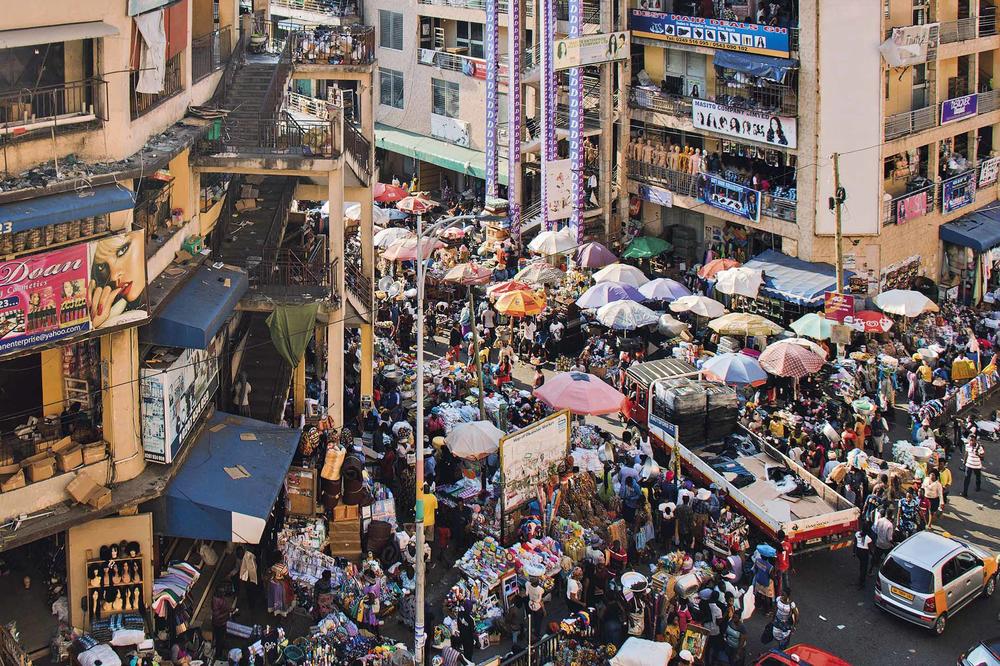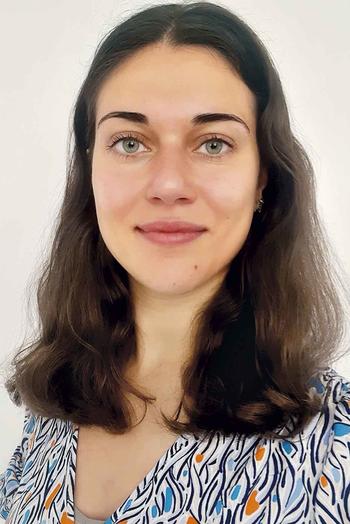Waste as a political issue
From Lankwitz to Ghana: Maria Petrova undertook a field research trip to the West African country for her master's thesis - she was financially supported by the Ernst Reuter Society.
May 26, 2023
The markets of the Ghanaian capital were the subject of Maria Petrova's master's thesis.
Image Credit: Erin Johnson
Food, spices and fabrics are offered at the stalls, it is colorful, loud, bustling - and in many corners dirty. Standing in the middle of the market hustle and bustle in Ghana's capital, Accra, is Maria Petrova. The 27-year-old is studying geographic development research at Freie Universität and has come to the West African country with a fellow student to conduct research for her master's thesis.
For there is this one topic that has accompanied Petrova throughout her studies and that is also one of the country's biggest problems: garbage. This can be clearly seen among the stalls in Accra's marketplaces: trash is piled up there. In addition, the metropolis of just under 280,000 inhabitants is also home to Africa's best-known electric waste dump, Agbogbloshie.
During her first semester in her master's program, Petrova took several seminars on the treatment and disposal of waste and garbage with geography professor Dr. Uli Beisel. However, Petrova's planned research stay abroad, which is a regular part of the master's program, coincided with the height of the Corona pandemic. She therefore stayed in Berlin. But with her master's thesis, the idea took shape "to work on site in Africa for parts of my thesis - supported by my lecturer's Ghanaian network," says Petrova. Her wish was finally realized thanks to funding from the Ernst Reuter Society, which financed the four-week research stay in Accra. "I'm really grateful for this opportunity and think it's great that the ERG is contributing to more educational equity through funding of this kind."
The less effective waste collection leads to huge mountains of waste
But what exactly is the master's thesis about? "I'm looking at the public management of waste collection in Accra," Petrova explains. "Here in Germany, we collect our garbage at home, throw it sorted into different garbage cans and at some point it is collected." What sounds so banal, however, obviously does not work in other countries - in Ghana, for example. Here, there is no effective waste collection system. The result: huge mountains of waste. "I wanted to find out how the waste collection system is structured politically, what tasks and responsibilities state or private actors have," the student continues.
And so, in February 2023, the Berlin native walks through Accra's markets to talk to local people. She had previously learned from the media that a new waste law had been passed in Ghana at the beginning of 2022 under the military-like title "Operation Clean your Frontage" - a campaign obliging the population to undertake "clean-up exercises", so-called "cleaning exercises". "What I found most interesting was the shift of government responsibility to the individual level," Petrova points out. Often, she says, this approach is a strategy of local governments that are overwhelmed with solving a problem.
Petrova had hoped to talk to people in Accra who had participated in the government's garbage drive. But the interest in talking was often one-sided: although she was assisted by a Ghanaian student, the market traders were very skeptical of her, she says. The skepticism, she says, stemmed in part from the fact that people often felt misrepresented in the media and academia.
The student also had to show a great deal of perseverance in her attempts to talk to the relevant authorities. Petrova had not expected such great resistance: "I prepared myself really well and did not travel to Ghana naively at all," she says. However, the fact that it would then be so difficult to obtain information on site proved one thing above all: the topic of waste collection is highly political. "My supervisor Uli Beisel conveyed to me that I could definitely consider it a research result that the authorities didn't want to talk to me about the garbage problem."
After four weeks of field research in Ghana, Maria Petrova has been back in Berlin since March 2023 and is now in the process of evaluating the results of her research. In the end, she was able to conduct some conversations after all due to her perseverance. What else has she learned during this time? "Even with the best preparation, research does not always run smoothly.”
By Melanie Hansen


